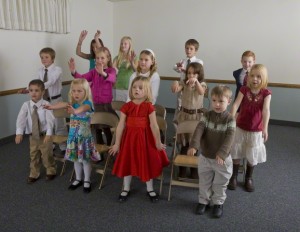Children Are Natural Actors—How Can We Foster Their Growth?
Recently, my husband and I taught a Sunday School class of 10- and 11-year-olds. To enliven the lesson, we decided to ask them to act out a story from the scriptures. Their eyes lit up when they found out what we would be doing, and they got really into the story as my husband narrated and I acted alongside them. When we discussed what happened in the story afterward, they were very attentive and thoughtful. They had captured the action because they had lived it!
 Children are often great actors because they have no fear of looking silly in front of an audience. Even shy children will perform in front of those with whom they feel comfortable. Toddlers are constantly running around and picking up objects—props, if you will—and using them to pretend: some play house, others play cars. Older children also enjoy telling jokes, singing, dancing, describing a book or movie, playing games, and reciting poetry—all theatrical activities. For those children who truly want to become actors, parents may learn from Denise Simon’s article “Three Reasons to Support Your Child’s Acting Dream.”
Children are often great actors because they have no fear of looking silly in front of an audience. Even shy children will perform in front of those with whom they feel comfortable. Toddlers are constantly running around and picking up objects—props, if you will—and using them to pretend: some play house, others play cars. Older children also enjoy telling jokes, singing, dancing, describing a book or movie, playing games, and reciting poetry—all theatrical activities. For those children who truly want to become actors, parents may learn from Denise Simon’s article “Three Reasons to Support Your Child’s Acting Dream.”
For all children, these skills of creativity and presentation are all critical to their success in school and in life. Gai Jones, in her book The Student Actor Prepares: Acting for Life, lists several life skills we develop through acting:
- Creating imaginative, bold ideas
- Reasoning
- Thinking reflectively
- Developing positive working habits
- Being open minded and flexible
- Conveying emotions with your voice and body
- Listening appreciatively
- Cooperating
- Thinking on your feet
- Reading and analyzing written material
What adult wouldn’t hope that a child develops these same life skills? Parents and teachers can foster their children’s acting abilities home, at school, and at church with ideas like these below.
At home
- Provide props. Toys can invite creative and theatrical play. To avoid expensive costs of fancy toys, the National Association for the Education of Young Children suggests common household items that can double as toys, like plastic spoons and balls of yarn.
- Provide a stage. Go to the park or the backyard for open spaces to dance and run. Move the couch and stand behind it for a puppet show. Tie a sheet on a window frame, put a lamp behind it, and learn to do shadow puppets with your hands.
- Provide activities. Ask kids to act out their favorite movies or books with paper dolls, Barbies, dolls, stuffed animals, or action figures. Fun time guaranteed!
At school
- Provide props. After reading a story, have students create masks with brown paper bags, etc., to use in acting out the story. Pinterest has tons of ideas on decorating masks.
- Provide a stage. Most schools have an auditorium or cafetorium with a real stage, but teachers don’t need to get so formal. They can use the front of the classroom or move aside desks and have audience members sit on the floor. Or, the props themselves become the stage through Teaching Channel’s theater boxes.
- Provide activities. One I like is “Fortunately, Unfortunately,” in which you sit in a circle and one person begins a sentence with “fortunately,” then the next with “unfortunately,” to form a story. Many websites have easy theater games, such as DramaResource.com.
At church
- Provide props. To act out stories from the scriptures, simple props like strips of cloth to tie around kids’ foreheads or waists and chalk to draw the backdrop are sufficient.
- Provide a stage. Probably the best idea is to stay inside the classroom, but you might get permission from parents and other leaders to venture outdoors if you stay close to the church.
- Provide activities. Act out scripture stories, as I mentioned in the beginning. SugarDoodle.net has lots of resources, including scripts. For example, here’s one script on the story of the Ten Virgins in the New Testament.
—Leah Davis Christopher, Stance
Image from lds.org. License.
1 thought on “Children Are Natural Actors—How Can We Foster Their Growth?”
You must be logged in to post a comment.
Always nice taking care about childhood…